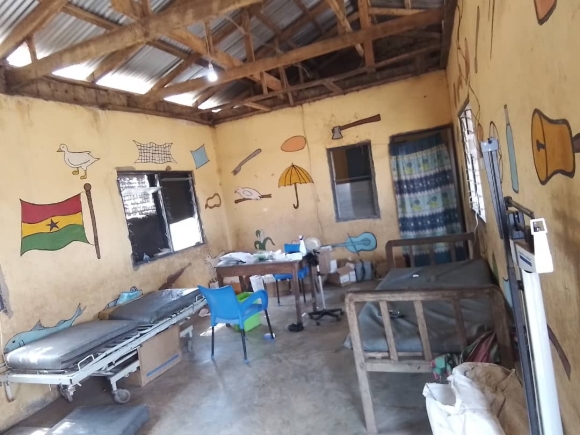As the world commemorates World Health Day under the theme “Healthy Beginnings, Hopeful Futures,” the plight of thousands in underserved communities such as those in the Wulensi District underscores Ghana’s pressing need to prioritise inclusive and equitable healthcare.
In the farming communities of Baduli, Sakpe, and Sadando in the Wulensi District of the Northern Region, over 10,000 residents rely on a single-room structure for medical care.
Originally constructed in 2019 as a Children’s Day Care Centre by Songtaba, a local NGO based in Tamale, with support from ActionAid and sponsorship by the Dutch Ministry of Foreign Affairs, the building was later converted out of necessity into the area’s only health post.
Now, the NGO is set to reclaim the facility for its intended purpose, placing the entire community on the verge of a healthcare crisis.
World Health Day, observed annually on April 7 by the World Health Organization (WHO), aims to raise awareness about health-related challenges, the importance of preventive care, and the need for improved healthcare systems.
This year’s theme emphasises the well-being of mothers and babies as the foundation of healthy families and strong communities.
But for residents of Sakpe-Baduli, the threat of losing their makeshift facility raises serious concerns about the government’s commitment to rural healthcare. Without adequate intervention, the community’s vulnerability to preventable illnesses and avoidable deaths will only deepen.
The facility’s current condition is alarming: there is no ceiling, the windows are broken, and it is infested with bats and mosquitoes. It lacks even the most basic medical equipment and sanitation infrastructure. The room contains just one worn-out bed, two plastic chairs, a table, a weighing scale, and a Veronica bucket. Since operations began in June 2023, more than 800 patients have sought care there—highlighting the community’s dire need for accessible health services.
“This situation has caused untold hardship for families,” a resident told Graphic Online. “Many lives have been lost because people have to travel long distances to get medical attention.”
The crisis in Sakpe-Baduli reflects a broader national issue: poor healthcare infrastructure, shortages of essential medicines, and a lack of trained health professionals in rural areas. The facility operates with only two health workers who rotate shifts, and their frequent absences often leave the facility unattended. Vulnerable groups—especially pregnant women, children, and the elderly—bear the brunt of this crisis.
The nearest alternative health centres are in Wulensi and Bimbilla, both requiring long, difficult journeys, often without reliable transportation, especially during the rainy season.
In a bid to address the crisis, Ubor Kojo Blacky Simon III, Chief of Baduli, launched a community self-help initiative to construct a Community-Based Health Planning and Services (CHPS) compound. Households were asked to contribute GHS 50 for singles and GHS 100 for married couples. However, the initiative has faced resistance due to widespread economic hardship.
“For now, we wait and hope our voices will be heard—that the promise of quality healthcare will reach communities like ours, not just the cities,” the chief lamented.
“Our chief is losing support because people feel overburdened,” another resident added. “The government and district assembly should be solving these problems—not us.”
This year’s World Health Day must serve as a wake-up call for policymakers, health authorities, and development partners. More action is needed to ensure reliable, inclusive, and quality healthcare for rural communities. If Ghana is to meet its Universal Health Coverage (UHC) targets and fulfil its Sustainable Development Goals (SDGs), it must begin by investing in rural healthcare systems—starting with infrastructure, staffing, equipment, and consistent drug supply chains.
The residents of Baduli, Sakpe, and Sadando are calling for urgent intervention. Without a functional health facility, their health—and their dignity—remains at serious risk.

